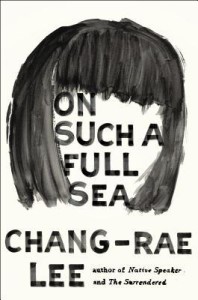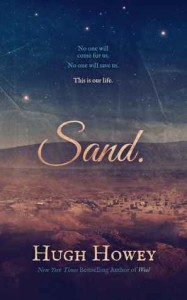
On Such a Full Sea is supposed to be a post apocalyptic, dystopian novel. These are some of my favorite books in a SciFi sub-genre. This was probably clear when I reviewed Sand. Chang-rae Lee is a newcomer to this world. He typically writes literature revolving around Asian-Americans and the cultural issues living in America. On Such a Full Sea was not entirely unlike this. Many of the characters tended to be — but were not exclusively– of Asian descent.
The basic premise is that sometime in the future, “New China” (since China itself had already been destroyed from environmental ruin) became uninhabitable. Many flocked from New China to the already rundown urban neighborhoods of America. Since they were mostly abandoned it was easy to take over and rebuild them. Think Detroit, most of the urban area is a mess, with only the outskirts really used even in present day. The story begins, and constantly focuses on B-Mor, the old city of Baltimore. B-Mor is a walled city where (I suppose) what is equivalent to a middle class live. They are mostly assigned work detail and a good deal of their life is dictated by a Directorate.The more wealthy can open up shops, though this is usually a family business or done after retirement.
The analogue to the upper class would be the Charters. They live in charter villages, have lucrative careers, and pay to live the way they do. Their lives are a little freer, but still heavily governed. Nothing is guaranteed with them and if they lose their money, it is a one way trip to the bottom. Their biggest luxury is their medical access. The world is plagued by “C” which clearly seems to refer to cancer. Everyone gets it, everyone is born with it. The question is how long can you treat it to live your life. The charters get access regular full workups and more expensive treatments. There is little upward mobility. The top 1-2% can test out and be accepted as a charter, or is someone has an exorbitant amount of money, they can buy their way in. The complete opposite of this upper-class life is out side of the walls. The Open Counties.
Basically the open counties are the wild west. There is no government out there. They live in the wastelands and make their own life. Some live comfortable, some struggle to survive the lawlessness. The open counties are also the only way to drive from one place to another, with the exception of “Globals” which are flights around the county for the more wealthy charters. One thing to note, true to the Author’s style most charters and community residents are of Asian decent, primarily New Chinese, some have “native” aka American blood mixed in.
Now, while the story may be about this society, it is really about Fan, and her boyfriend Reg. In the beginning they are typical young B-Mor workers. Fan is a diver in the fish tanks and Reg works about in the grow areas where heavily regulated produce is grown. To really simplify the plot, Reg is called into an office and nobody sees him again. Fan goes on for a while acting normal, but eventually leaves into the open counties looking for him. After this Reg and Fan become folk heroes, cultural obsessions. They are a symbol, but of what I really cannot tell you. I am not holding anything back, I honestly am not sure. They formula to the book is as follows: Fan is in one place for a period of time, something unpleasant usually happens, she gets out and goes someplace else. The unidentified narrator, the anonymous “We” of B-Mor, goes off on a tangentially relevant (at best) exposition and we start again.
So I think the last two lines of the previous paragraph really summed up my thoughts on this book. I know that Chang-rae Lee is an artist with his prose, but I could not get into this novel. Technique is not something which can superseded content. It was as though every time the story began to build, whenever there was an interesting plot turn, it was undoubtedly broken up with some meandering commentary by the narrator about how “We at B-Mor” feel about this, relate to it, or have some deeper insight. I tried so hard to like this book. I kept saying that after this chapter it will surely pick up, it has to! But I was sadly mistaken. If the majority of the “We at B-Mor” and “What we as B-Mors know” or “As we in B-Mor know of our Fan” were taken out, I think the story would have more of a flow. Those sections added nothing in my opinion and only sought to break up and derail an otherwise interesting and cohesive tale. More importantly how does this “we at B-Mor” know so much about Fan’s tale after leaving, and how do they have such an insight into Fan herself? By all description she was extremely quite and kept to herself with the exception of her time with Reg. This little idea completely pulled me out of the story. The frustration from the interludes took my enthusiasm in the way a kick to the chest takes your breath. I struggled to find the desire to continue on to the next chapter.
The story, distilled in essence is a good one. It contained interesting commentary on humanity and showed a reasonable amount of struggle, if perhaps a bit too much for one person is a condensed period of time. For that purpose it succeeds in the realm of dystopian novels. It fails however in making that story into an truly compelling or enjoyable experience. Written differently and with only a select few passages of exposition, I know I would have liked this novel. The writing style and narrative completely ruined it for me.
I cannot in good conscience give this more than 2/5 stars. I do not discourage people from picking this up though. Maybe you disagree with me. You would neither be the first nor the last to do so. I have cut and reworked a significant amount of what I would have liked to say out to prevent spoilers so the story will still be new to you.
Check back for more SF/F book reviews and information. I will try to update more frequently.

